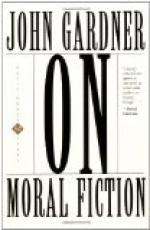|
This section contains 1,096 words (approx. 4 pages at 300 words per page) |

|
"Nothing could be more obvious," says John Gardner [in On Moral Fiction], "than that art should be moral and that the first business of criticism, at least some of the time, should be to judge works of literature (or painting or even music) on grounds of the production's moral worth." Acknowledging our usual embarrassment in the presence of words like "morality," he sets out to demonstrate the practice of moral criticism. Gardner positions his moral telescope. He scans the contemporary literary scene as though it were a night sky. And he finds himself as distressed by its occasional cold dazzle as by its expanses of emptiness. Gardner admits outright that he is a constellation hunter in search of the human image writ large, the illuminations of world and self classically provided by Homer, Dante, Shakespeare, Tolstoy. Our stars, he concludes, shed no radiance because they shine primarily for...
|
This section contains 1,096 words (approx. 4 pages at 300 words per page) |

|


